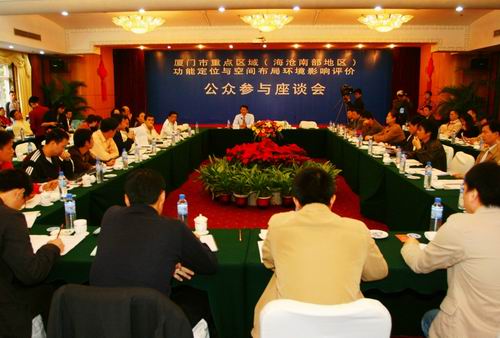Almost all the speakers at two public hearings in Xiamen this week objected to plans to restart the construction of a controversial chemical plant that was suspended earlier this year following persistent public protests.
A senior government official of Xiamen also promised at the conclusion of the hearing on Friday that Xiamen government will properly deal with the environment assessment." "The phase of public participation (in environment assessment of the project and Xiamen's future development) has ended," Zhu Zilu, secretary-general of the Xiamen municipal government, told the participants at the hearing. "And I assure you that the municipal government will undoubtedly follow the requirements of 'Scientific Outlook on Development' and properly deal with the environment assessment."
The Scientific Outlook on Development has been a new doctrine of the Chinese Communist Party that stresses sustainable economic growth and harmony between man and the nature.
Of the 107 members of public selected by lottery to represent the citizens of Xiamen at the hearings on Thursday and Friday, 91 opposed the project, 15 voiced their support, and one left without speaking.
About 80 local lawmakers and political advisors were also in attendance and out of the 15 that addressed the forum, 14 spoke against the municipal government's plan to build the paraxylene (PX) plant.
Numerous members of the public hearing - who were only given a number each to identify themselves while speaking - lashed out at the project, arguing the plant would be detrimental to the environment and people's health.
They said Xiamen would lose its longstanding reputation as one of the most livable cities in China.
"If you were going to pick two apples to eat, knowing that one of them was poisonous and the other was not, then, who would dare make the choice?" said a male doctor, who could only be identified as "Representative No. 31".
One woman - "No. 35" - said the existence of the plant would prompt her to reassess her living situation.
"I came to Xiamen from Guangzhou with my husband a few years ago just for its clean air and beautiful scenery. I think I'll have to leave if the plant is built," she said.
Zeng Huaqun, a local lawmaker and also a law professor at Xiamen University, said, "It's not whether the city should build it or not, it's that the project must be stopped immediately. It's time to make a decision now."
"Risks always exist in the development of chemical projects and sometimes we cannot effectively guard against them," said "No. 49".
Other citizens played down health concerns.
"I think the project will benefit Xiamen for generations. I come into contact with the chemical paraxylene in a laboratory everyday, and I haven't fallen ill - neither have my colleagues who have done so for years. I believe residents will live harmoniously with the chemical plant," said "No. 22".
"Xiamen cannot just rely on tourism for development or on scenery for attracting talented people," said Lu Shaofeng, a female local political advisor.
The representatives of the Xiamen residents were chosen on Tuesday by lottery from a total of 624 people who had registered. About 100 residents were picked as representatives and another 100 were selected as alternate representatives.
The two hearings were organized by the Xiamen municipal government and lasted a total of eight hours.
The Xiamen municipal government began inviting citizens to submit their opinions on the future of the chemical project on December 5 via email, post or telephone to the municipal government or the Beijing-based Chinese Research Academy of Environmental Sciences, the organization in charge of an assessment of the environmental impact of the project.
"So far, we have received more than 3,000 e-mails, 2,000 telephone calls and about 10 letters," said Shu Jianmin, deputy head of the Beijing academy.
"We will classify the opinions and suggestions and provide replies conscientiously," Shu said, refusing to disclose the percentage of the correspondence that criticized the project.
No indication of when a final decision might be made was given.
Li Yanwu, director of the academy's center for environmental assessment, previously said the environmental experts would include some of the opinions and suggestions raised at the hearing in their newly completed report on the environmental assessment of the chemical project.
The Xiamen authorities put chemical project, earmarked for the city's Haicang District 16 kilometers from the city center, on hold on May 30 after coming under huge pressure from citizens virulently opposed to the project who said it is polluting and potentially dangerous.
On June 7, the Xiamen municipal government announced that the construction of the chemical project would rest on an environmental assessment.
A month later, the Chinese Research Academy of Environmental Sciences was entrusted by the Xiamen municipal government to carry out the assessment. Li and his colleagues completed the report late last month.
According to an abbreviated version of the report posted on the official website of the municipal government, experts concluded that the southern area of Haicang District, the original location of the planned PX plant, was too small and inadequate for the diffusion of atmospheric pollution.
The local government had set two targets for the southern part of Haicang: to develop the area into a sub-center of the city and to create an industrial zone focused on the chemical industry.
However, according to the environmental assessment report, urban planners were advised to choose one or the other, but not both.
If the city government's priority is the first target, then the area is unsuitable for the development of the chemical industry, the report said. If the latter, a number of residential buildings should be demolished, citizens should be relocated and strict controls over the chemical plants should be imposed, it continued.
If the 10.8-billion-yuan (about 1.4 billion U.S. dollars) project by Tenglong Aromatic PX (Xiamen) Co. Ltd. goes ahead, it is expected to produce 800,000 tons of paraxylene and generate revenues of 80 billion yuan (10.77 billion U.S. dollars) a year.
(Xinhua News Agency December 15, 2007)






